EXCLUSIVE REPORT
Fraudulent 2023 local elections — Constitutional Council to determine fate of Mozambique’s democracy?
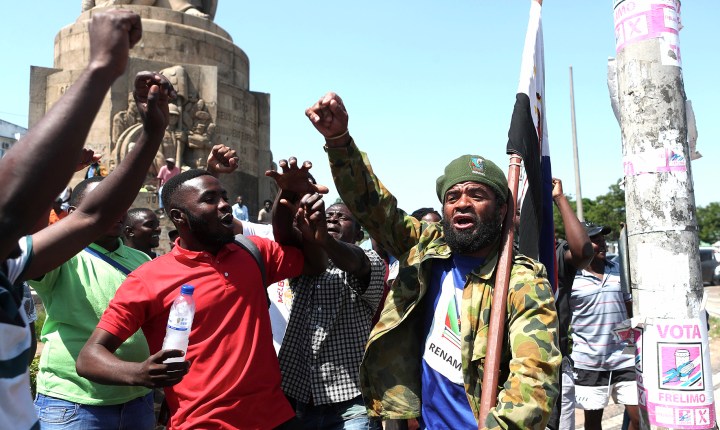
Whatever the Constitutional Council’s decision, the public has spoken and spoken strongly. They have turned against Frelimo and taken to the streets to protest against electoral fraud. Depending on the outcome, the council’s decision is expected to have a significant impact on the consolidation of democracy in Mozambique, or possibly weaken it as people realise there is no point in voting because their vote will not be taken into account.
Everyone agrees that the 11 October elections in Mozambique were the dirtiest in the history of multiparty democracy. Ignoring the dirty nature of the elections, which were marred by the most widespread fraud in the history of the young democracy, the National Electoral Commission (CNE) declared Frelimo the winner in 64 of the 65 municipalities on 26 October, giving the party a kind of carte blanche to return to one-party rule.
The way in which the Technical Secretariat for Electoral Administration (the technical arm of the CNE) conducted the process, the way in which the CNE announced the results, ignoring all evidence of fraud, has put democracy in a coma. The people are in the streets contesting the results and the police are proving to be an ally of the CNE in its agenda of murdering democracy, arresting, injuring and preventing the people from demanding their rights.
Faced with this scenario of democratic coma, the only hope left for Mozambicans is the Constitutional Council (CC), the body to which the opposition has referred the disputed appeals and whose decisions are incontestable. If the CC validates the results of the criminal management of the elections, in order to deny the will of the people expressed at the ballot box, and hand victory to the Frelimo party, it will be the premature death of the democracy established by the 1990 constitution of the Republic of Mozambique.
The reasons for the decisions of the district courts, which ordered a full or partial rerun or recount, are sufficient for the CC to annul the results and order a rerun. Although it annulled an election in Marromeu in 2018 and ordered a new vote due to obvious fraud, it is not expected to take such action this time due to the context of the political economy of governance, of which this body is also a part.
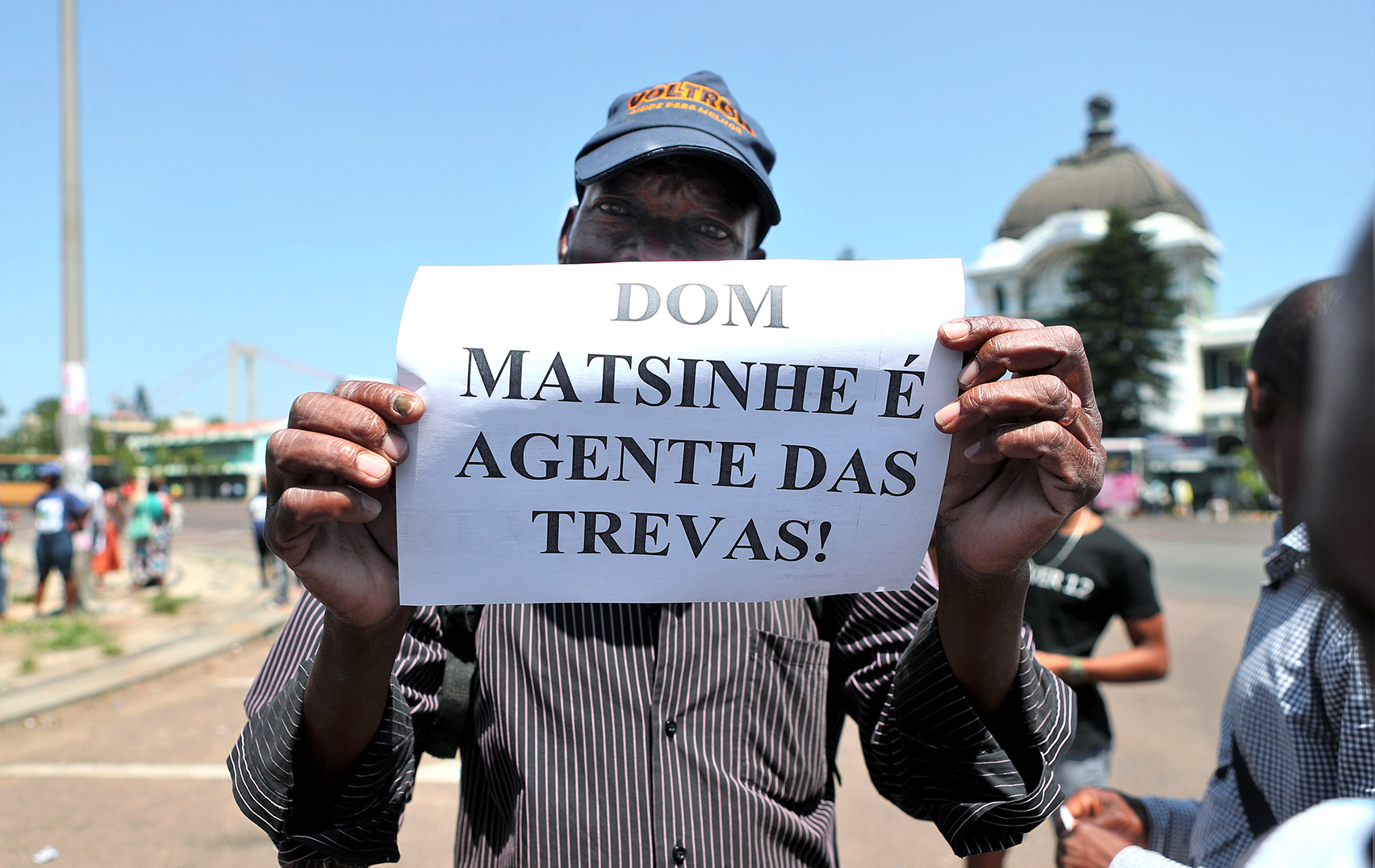
A Renamo supporter holds a sign that says ‘Bishop Matsinhe is an agent of darkness’ during a protest against the results of municipal elections in Maputo on 27 October 2023. (Photo: EPA-EFE / Luisa Nhantumbo)
Background
On 11 October, Mozambique held its sixth local elections. These were the first elections to be held after the completion of DDR (Disarmament, Demobilisation and Reintegration) and the closure of Renamo’s last military base. As you will recall, Mozambique had a civil war that ended in 1992 with a peace agreement signed in Rome between Frelimo and Renamo. However, it was necessary to sign further peace agreements because, although Mozambique held regular elections, electoral fraud in the subsequent elections led to a return to low-intensity warfare.
Thus, for the first time, the elections were held in a context of effective peace, despite the fact that the country faces violent extremism in northern Mozambique, where the al-Shabaab group has been causing instability and insecurity in the northern part of Cabo Delgado province for the past five years.
These elections took place against the backdrop of a deepening socioeconomic crisis in the country due to hidden debts, which led donors to cut budget support. This led to a recession in investment, which meant that Mozambique was unable to meet its international obligations and entered a public debt crisis that made it impossible to pay civil servants’ salaries.
The health and education systems are collapsing and morale in society is very low.
On the night of the count and tabulation, the power was cut, probably to facilitate fraud, which consisted of stuffing ballot boxes so that the number of votes in the box exceeded the number of voters on the electoral roll.
Frelimo is also proving incapable of inspiring confidence in the country and society. The elections took place amid rumours that President Filipe Jacinto Nyusi was seeking a third term in office. However, the revision of the constitution to allow for a third term was abandoned and the president has already called general elections for October next year, putting an end to speculation about his desire for a third term. Nyusi will therefore step down and there will be another Frelimo candidate in 2024.
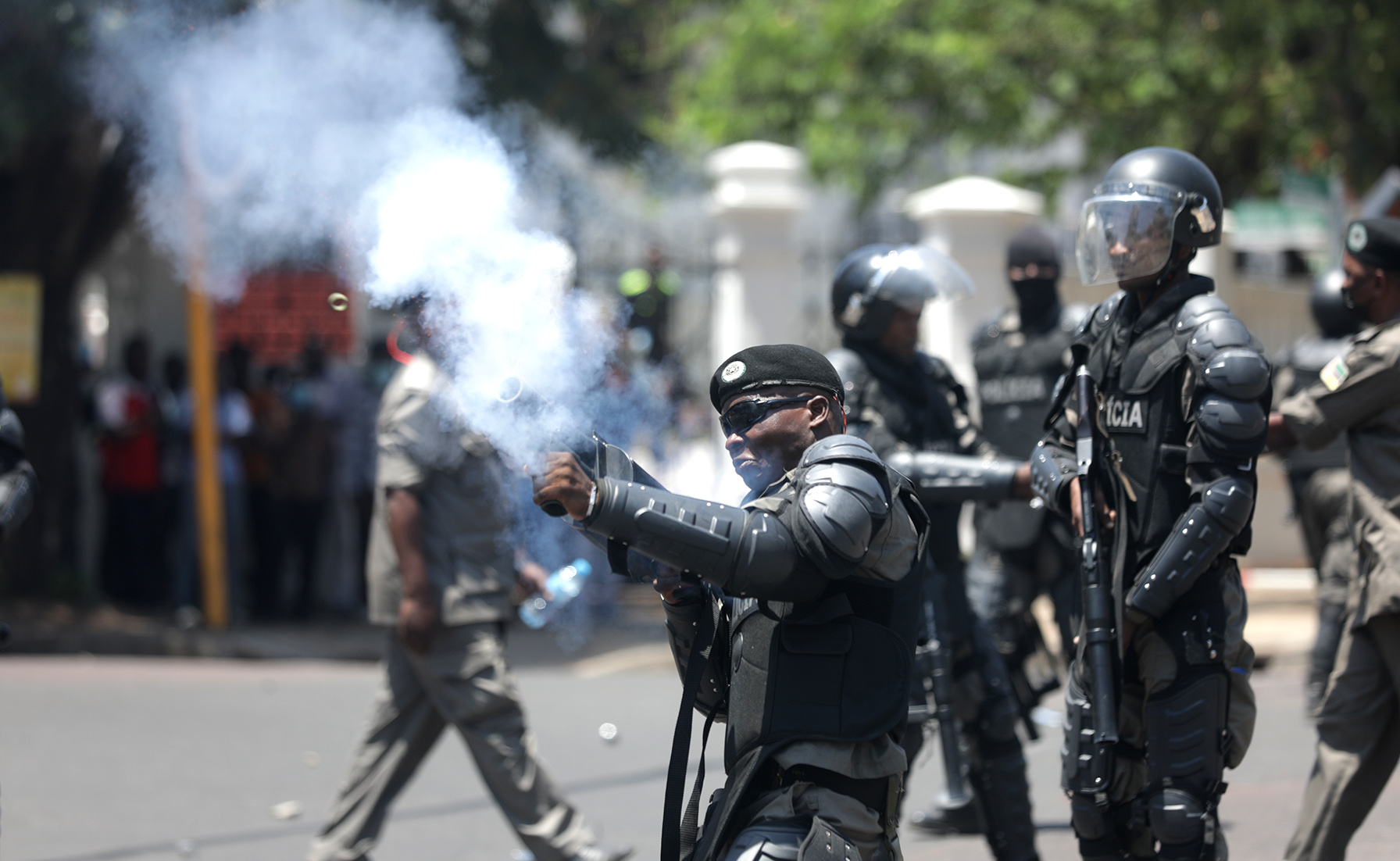
A riot police member fires tear gas during a protest by Renamo in repudiation of the municipal election results in Maputo on 27 October 2023. (Photo: EPA-EFE / Luisa Nhantumbo)
These elections were held in 65 municipalities. For a vast country like Mozambique, the fact that the elections took place in 65 municipalities may seem insignificant in political terms, but it is actually very significant.
Mozambique has one of the most centralised systems of administration and governance on the African continent, which has always been seen as an obstacle to the peace dividend due to the poor distribution of power between Mozambican political forces, especially between the warring parties that signed the peace agreement. Therefore, elections represent a real possibility for opposition parties to govern municipalities, giving them access to resources for institutional development, as well as power-sharing, which is seen in the literature as a guarantee of peace and stability in a post-conflict context.
Campaigning and voting
Voting day itself was peaceful, but the tabulation was seriously problematic.
First, there were suspicions that Frelimo had organised false observers, accrediting people who appeared to be observers but were actually there to obstruct the voting process and, in some cases, to promote fraud. This method was used particularly in the municipalities of Nampula City and Gurué. Some of the observers were found with more than one ballot paper, were arrested and taken to police stations, but it is not known what happened there.
The second pattern was that after voting and counting, when it was clear that Frelimo had lost, the presiding officers were instructed not to sign the minutes. This was very common in Quelimane, where many refused to sign the minutes, causing confusion. The idea was to later introduce falsified records, which did happen in many polling stations.
Police action was also problematic in many municipalities, particularly in Nampula, Quelimane, Angoche, Chiure and other areas. The police presence inside polling stations intimidated observers, who were removed to prevent them from observing the voting and counting process.
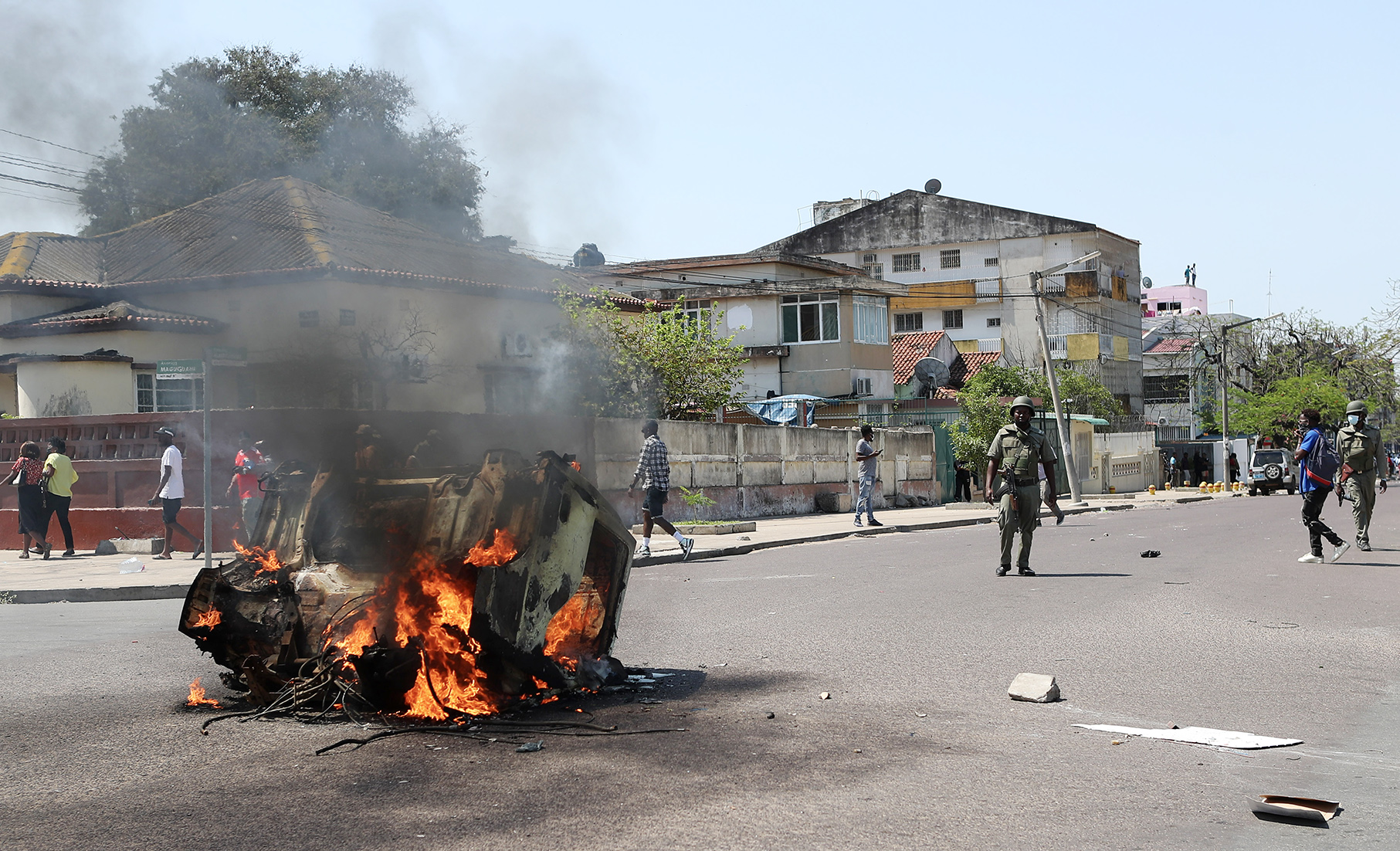
A vehicle burns during clashes between protesters and policemen over the election results in Maputo, Mozambique, on 27 October 2023. (Photo: EPA-EFE / Luisa Nhantumbo)
It also caused instability around the polling stations. This was partly due to the lack of confidence of the majority of the population, who promoted the campaign “Let’s vote and stay at the polling stations to follow the counting of our votes”, suspecting that their votes would not be taken into account by the scrutineers because they were in the service of Frelimo. This led to instability in many municipalities, such as Nampula, Beira and Quelimane, which was often exploited by the police to create chaos.
Another important point was the cutting off of electricity in many municipalities, especially where Frelimo was losing, including the cities of Maputo and Matola. The vote count took place in darkness because the Mozambican Electricity Company cut the power without warning.
It is important to note that Mozambique does not have the same power problems as other countries in the region, and any power cut must be announced in advance. However, on the night of the count and tabulation, the power was cut, probably to facilitate fraud, which consisted of stuffing ballot boxes so that the number of votes in the box exceeded the number of voters on the electoral roll.
Read more in Daily Maverick: Protecting election observers to bolster peace and democratic resilience in Mozambique
The most blatant situation, and the one that caused the most confusion, was the falsification of minutes, especially in Chókwé, Maputo and Matola. The original minutes, signed by all the members, were later falsified and the minutes used in the tabulation were not the real ones. This led to violent vote counting and tabulation in some municipalities, creating an atmosphere of violence.
In some cases, journalists were prevented from entering, and some members of the opposition who wanted to take part in the counting were turned away. The municipality of Matola was the most chaotic, but Quelimane and Nampula also experienced unrest during the counting process.
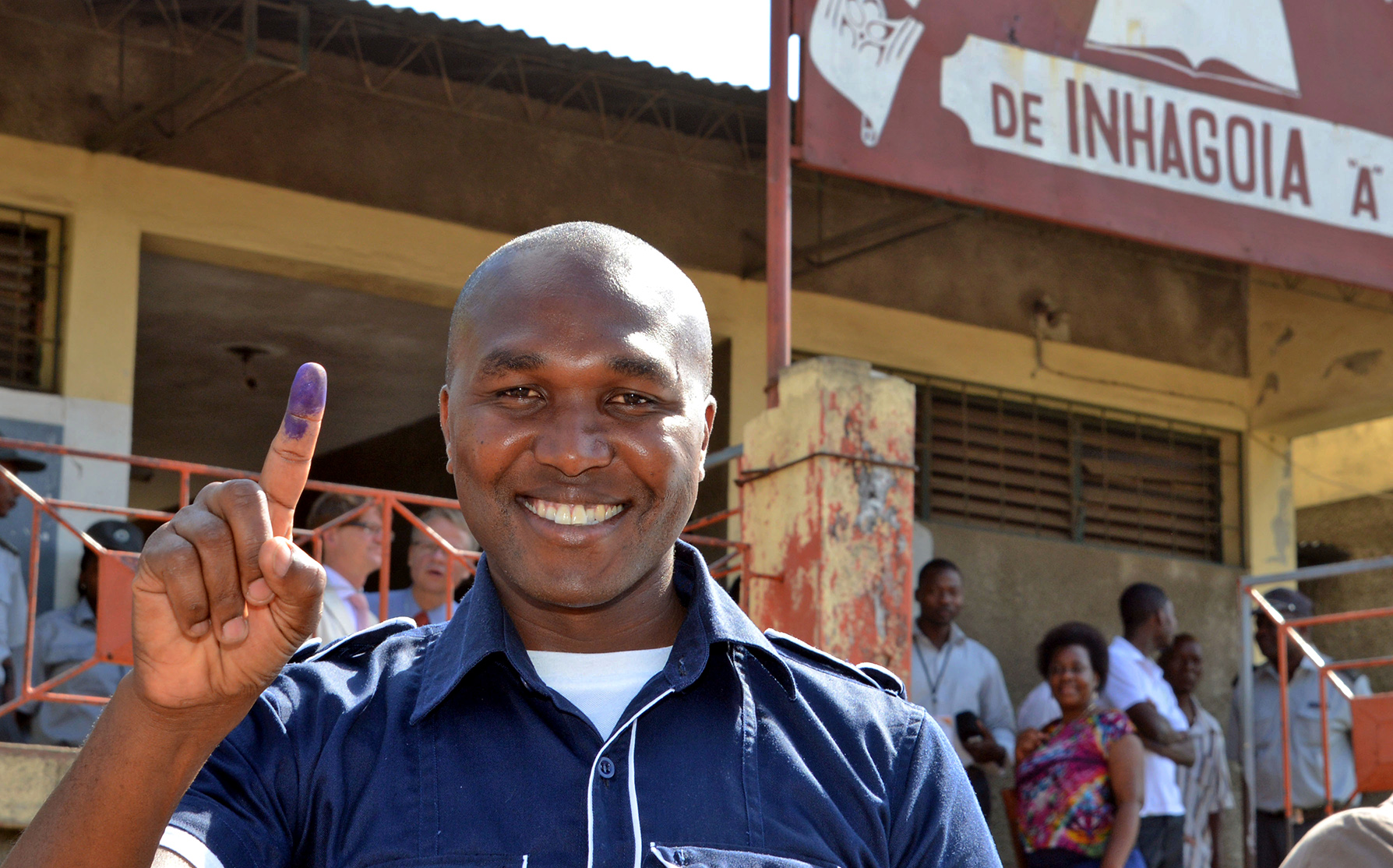
Maputo mayoral candidate Venancio Mondlane shows an ink-stained finger after he cast his vote during the municipal elections, in the city on 20 November 2013. (Photo: EPA / Antonio Silva)
Election violence and demonstrations
The media, particularly the private television station TV Sucesso, played a key role. It gave live coverage of all the irregularities in the municipalities of Maputo and Matola. It is important to remember that the president of this station is a leading member of Frelimo and a Frelimo deputy in the national assembly, which exacerbates the internal divisions.
The station played a crucial role, but social networks also played a key role. Messaging apps such as WhatsApp were used, although they were disabled for two or three hours to make it difficult for information to circulate. Nevertheless, information was circulated, including videos showing the scam in action.
The social networks documented the fraud and its spread. People saw it, which was a big plus because it mobilised them. People were outraged by the fraud.
When the election results were announced, people were very mobilised. The appeal and organisation of the Renamo party in the cities of Maputo, Quelimane, Nampula, Angoche, Nacala and Gurué brought thousands of people onto the streets. They were the first well-organised, peaceful and nonviolent demonstrations since the beginning of multiparty rule in Mozambique. People came out, rain or shine, to protest against Frelimo’s electoral fraud and to proclaim Renamo’s victory.
In the municipality of Quelimane, with its great cultural history, the demonstrations took on a musical dimension with the famous chant “trufafa trufafa – who won? Who will rule here?” It became an icon and mobilised the whole country.
On Friday, 27 October, Renamo led another day of demonstrations. The police responded with violence. At least two people were killed and dozens injured as a result of police violence. The police claim to have arrested more than 70 demonstrators.
No demonstrations were reported following the police operation. However, protests are expected to continue in the municipalities of Quelimane and Maputo, the epicentre of the protests.
The political significance of these demonstrations is a red card for Nyusi’s Frelimo, a highly corrupt party that doesn’t pay civil servants. The main beneficiaries are the political elite. Add to that the socioeconomic crisis in the country and the divisions within the Frelimo party. So, that’s the significance, and it’s expected to have an even greater impact.
Court decisions and the Constitutional Council
The district courts that heard the opposition’s appeals took courageous decisions.
- In Cuamba they declared the elections invalid and annulled them;
- The district court of Chókwè, Frelimo’s stronghold in the province of Gaza, also annulled the elections;
- In the municipality of Maputo, two district courts annulled the elections, including the most important district in the capital; and
- In the city of Matola, the court ordered a recount.
This is historic. It has never happened before that Mozambican courts have taken decisions against the electoral will of Frelimo.
When it was expected that more courts would take such bold decisions, the Constitutional Council, which is the highest constitutional body in the country and makes decisions that are final, overturned the decisions of the Chókwè and Cuamba courts. It also annulled the decisions of the Maputo municipal courts, stating that the assessment of the substance and the reversal of the annulment of the election results would be carried out in its own procedure.
It is understood that the CC took this action to allow the CNE to proclaim the election results on 26 October. With the decisions of the district courts in force, the CNE could not announce the results. That is why this race took place, trampling on the constitution of the republic by the Constitutional Council, which is responsible for guaranteeing the constitutionality of Mozambican legal norms, in order to facilitate the political expediency that favours Frelimo.
This is what it means to have a hijacked democracy in Mozambique, where electoral procedures are clearly flawed, including the use of the police, and the decisions of the courts of first instance are overturned by the Constitutional Council, whose decisions are incontestable, precisely to guarantee the maintenance of the status quo, which is Frelimo’s power at all costs.
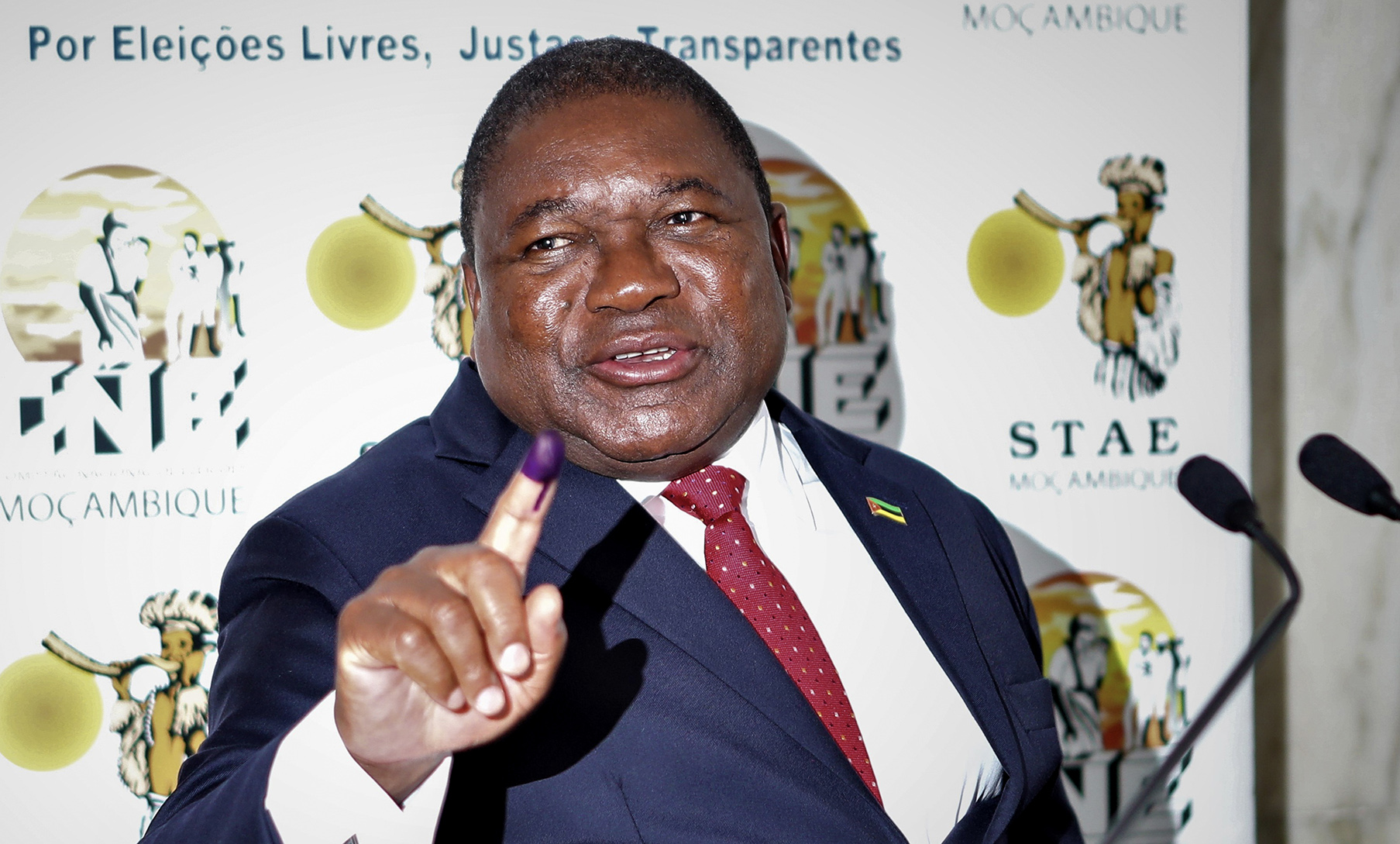
Mozambican President Filipe Nyusi after voting in the municipal elections, in Maputo on 11 October 2023. (Photo: EPA-EFE / Luisa Nhantumbo)
Announcement of results and prospects for electoral truth
This was expected to be a normal election, but it turned out not to be.
The electoral authorities were expected to declare the opposition the winner in Nampula, Angoche, Chiure, Ilha de Moçambique, Gurué, Quelimane and Beira. A declaration of victory was also expected in the municipality of Matola, where the post-election result, confirmed by parallel counts, was overwhelmingly in favour of the opposition. It was expected that the opposition’s victory in Matola would have a narrow margin, but it turned out to be surprising in its magnitude.
In the past, especially in 1998, in the elections that marked the start of the decentralisation process, the opposition did not take part because the electoral laws were not favourable to a clean electoral competition. In 1999, as proven by several commentators, the results were changed, going against the popular will.
It’s important to emphasise that for the first time there was a broad public sentiment that was expressed very openly. People took to the streets chanting “Renamo”, including people who didn’t vote for Renamo, who were proud of what Renamo had achieved.
It’s a red card for Frelimo, it’s a red card for Nyusi, but the political significance of this goes much further and could have deeper and more serious implications for the 2024 elections.
Especially in the city of Maputo, people identified with the young charismatic leaders, such as Venâncio Mondlane and Manuel de Araújo, who are now the new public faces of Renamo. People are publicly identifying with Renamo, wearing Renamo T-shirts and singing Renamo songs.
This represents a profound change in the country’s political culture, indicating greater acceptance. This is much deeper than the political reach of a local election. For the first time after multipartyism was established, when Renamo was at a very low level of acceptance in the southern part of the country, and in particular in the cities of Maputo and Matola, where there was no public sympathy for Renamo, that, today, people are publicly identifying with Renamo, wearing Renamo T-shirts and singing Renamo songs.
So, this means that there is a dimension of change in the political culture here in the country, with greater acceptance.
Of course, it’s also a red card for Frelimo, it’s a red card for Nyusi, but the political significance of this goes much further and could have deeper and more serious implications for the 2024 elections.
Many people feel, however, that to consolidate this mood there would also have to be changes within the opposition itself, especially within Renamo, whose president is seen as out of touch with the expectations of young people and the challenges facing the country. The Angolan model, where Unita sought a younger candidate and forced the MPLA candidate into a high-level electoral contest, is seen more favourably.
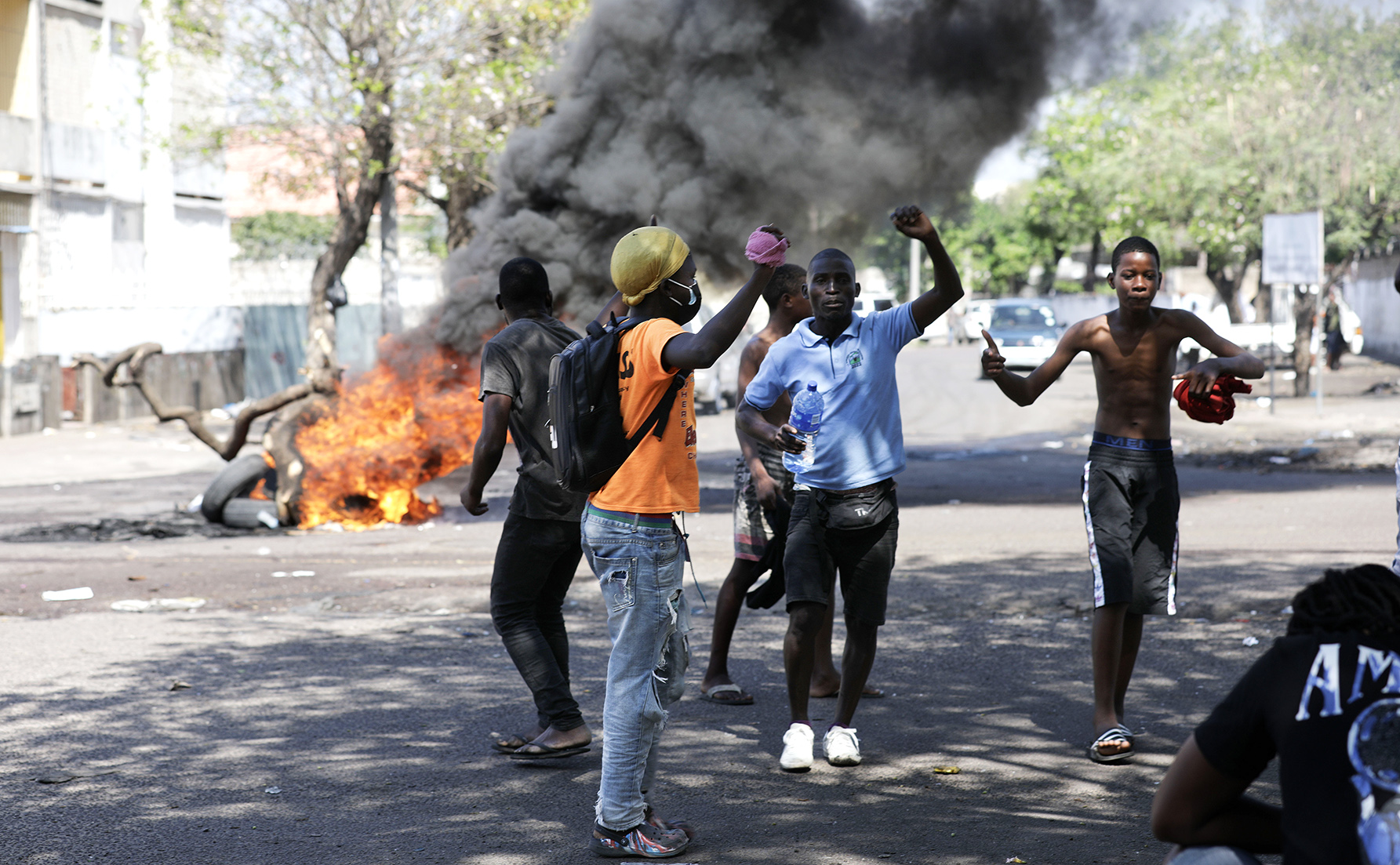
Demonstrators shout slogans as tyres burn during clashes with the police over the results of the sixth municipal elections in Maputo, Mozambique, on 27 October 2023. (Photo: EPA-EFE / Luisa Nhantumbo)
Concluding remarks
The CNE announced the results on 26 October, after the Constitutional Council had cleared the way for the CNE to proclaim the results announced by the district electoral commissions 12 days earlier.
This is another of Mozambique’s major problems: a municipal election held in 65 municipalities and a 15-day wait to know the results, which opens all the doors for the results to be manipulated, as was clearly seen. The announced results are not accepted by public opinion because they do not reflect reality.
Once this is done, the process will return to the Constitutional Council where the results are expected to be validated. At that point, the council will probably be able to assess the merits of the district judges’ decisions. The reasons for the decisions of the district courts are sufficient to annul the results and repeat the vote, but the council is not expected to do much.
Although it cancelled an election in Marromeu in 2018 and ordered a new vote due to obvious fraud, it is not expected to take such action this time due to the context of the political economy of governance, of which this body is also a part.
Regardless of the decision that will be taken, the public has spoken and spoken strongly. They have turned against Frelimo and taken to the streets to protest against electoral fraud. It is hoped that this will have a significant impact on the consolidation of democracy in Mozambique, or possibly weaken it, as people realise that it is not worth voting if their vote is not taken into account. DM
Adriano Nuvunga is director of the Centre for Democracy and Human Rights (CDD) in Mozambique. He is also chairperson of the Southern Africa Human Rights Defenders Network.




















 Become an Insider
Become an Insider
Comments - Please login in order to comment.